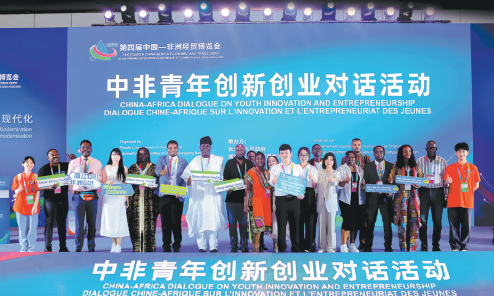
Young entrepreneurs from China and Africa gather at the China-Africa Dialogue on Youth Innovation and Entrepreneurship, held in Changsha, Hunan province, on June 13.


For Philipo Mrutu, a 33-year-old Tanzanian entrepreneur and CEO of Mrutu Agro-Solutions Co. Ltd., his first visit to Changsha, capital of Hunan province, was more than just a business trip — it was a gateway to witnessing the deepening ties between China and Africa.
"I'm very excited to see how beautiful China is, and I'm very impressed by how people at their stands are busy explaining their products and services," said Mrutu. "We also had the opportunity to see how China and Africa are working together through various government collaborations."
Mrutu was one of over 300 participants at the China-Africa Dialogue on Youth Innovation and Entrepreneurship, held on June 13 in Changsha. The event was a key sideline activity of the 4th China-Africa Economic and Trade Expo, which took place from June 12 to 15.
The forum provided a platform for government officials, business leaders, representatives of international organizations, and young innovators to exchange ideas and build partnerships through training sessions, keynote speeches, and networking events.
Speaking at the opening ceremony, Ghana's Minister of Foreign Affairs Samuel Okudzeto Ablakwa emphasized the critical role of youth in shaping the future.
"We must not only plan for the youth, but also make them part of the decision-making process," he said. "That is how we change the world and ensure a secure future for China-Africa relations."
Jacqueline Lydia Mikolo, minister of Small and Medium-Sized Enterprises of the Republic of the Congo, echoed this sentiment.
"Youth are the future of China-Africa friendship. We hope to draw from China's sustainable development experience and create win-win opportunities," she said in her opening speech.
Among the many young innovators at the forum was Li Jiarui, a 26-year-old PhD student at Hunan University and founder of Hunan Ningying New Materials Technology Co., Ltd., who began his entrepreneurial journey at just 19.
As a chemistry major, Li has applied his academic expertise to entrepreneurship by founding a company that develops innovative chemical admixtures, which reduce cement usage in concrete by 30 to 50 percent.
"This technology can significantly lower carbon emissions and construction costs, supporting the goal of sustainable development," he explained. "It also uses industrial solid waste to further replace traditional cement materials."
Li saw the forum as a valuable platform for mutual learning. "It helped me realize that many young African entrepreneurs are deeply involved in infrastructure and construction — sectors that are growing rapidly across the continent," he said.
The forum also provided a space for participants to reflect on the common challenges faced by young entrepreneurs. "Many young people have brilliant ideas, but these ideas won't succeed without good markets, financial support, or mentorship," Mrutu said.
Beyond business
Huang Hai, chairman of Hunan Yiwei Agricultural Development Co., Ltd. and the signatory representative for the African side, offered practical advice to young Chinese entrepreneurs entering African markets.
"Africa is not a single market — it has more than 50 countries with different needs," he said. "Young entrepreneurs must listen, learn, and avoid assuming their products will succeed without local adaptation."
Huang stressed the importance of humility and a long-term mindset. "People often say Africa is full of gold, but you can't mine gold without the right tools. Success requires commitment, research, and respect," he added.
For Odjo Rachald, a 26-year-old entrepreneur from Benin and a recent graduate in international economics and trade from Central South University in Changsha, the forum was about more than policies — it was about friendships built through trade and people-to-people exchanges.
At the event, Rachald finally met several business partners he had previously only worked with online, including a longtime Chinese collaborator from Zhuzhou, Hunan, who had spent nearly a decade working in Benin.
"Meeting someone you've worked with online for years in person was very meaningful," he said. "Some of my Chinese clients have even become close friends, inviting me to their homes and supporting me through difficult times."
Drawing on his cross-cultural experiences, Rachald emphasized the importance of cultural understanding in building successful partnerships.
"For example, an African worker might want to celebrate all evening after receiving payment, while in China, that same moment is seen as the start of the next task," he explained. "Neither is wrong — they just reflect different cultures."
"Understanding those small differences and showing empathy may seem minor in business, but it's exactly where cooperation begins," he added.










